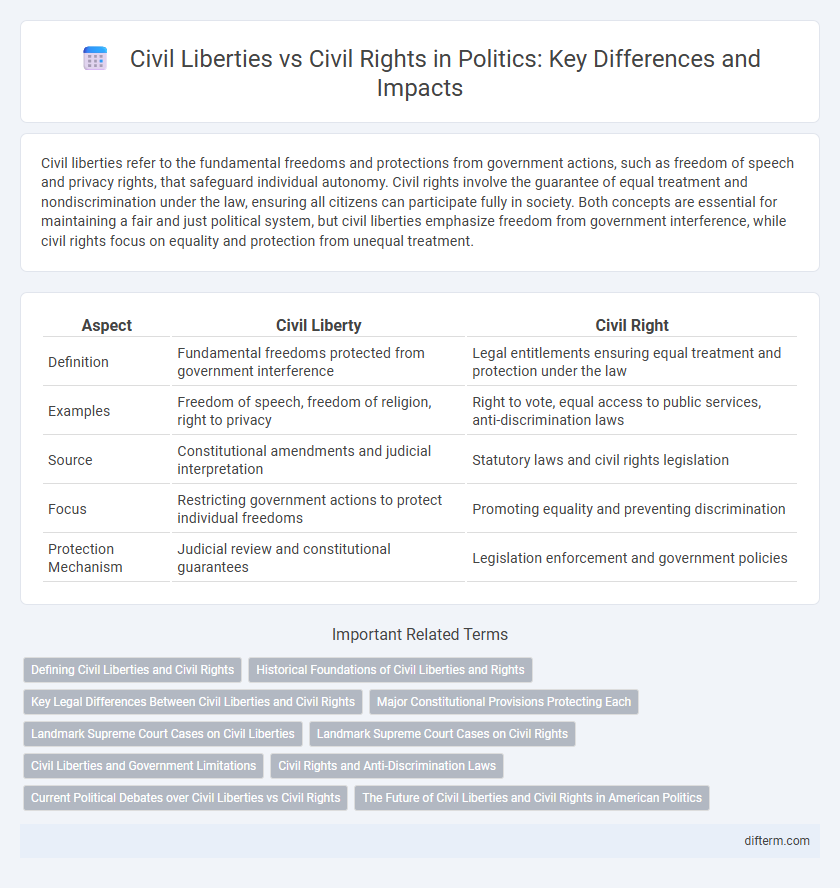Civil liberties refer to the fundamental freedoms and protections from government actions, such as freedom of speech and privacy rights, that safeguard individual autonomy. Civil rights involve the guarantee of equal treatment and nondiscrimination under the law, ensuring all citizens can participate fully in society. Both concepts are essential for maintaining a fair and just political system, but civil liberties emphasize freedom from government interference, while civil rights focus on equality and protection from unequal treatment.
Table of Comparison
| Aspect | Civil Liberty | Civil Right |
|---|---|---|
| Definition | Fundamental freedoms protected from government interference | Legal entitlements ensuring equal treatment and protection under the law |
| Examples | Freedom of speech, freedom of religion, right to privacy | Right to vote, equal access to public services, anti-discrimination laws |
| Source | Constitutional amendments and judicial interpretation | Statutory laws and civil rights legislation |
| Focus | Restricting government actions to protect individual freedoms | Promoting equality and preventing discrimination |
| Protection Mechanism | Judicial review and constitutional guarantees | Legislation enforcement and government policies |
Defining Civil Liberties and Civil Rights
Civil liberties consist of fundamental freedoms protected from government interference, such as freedom of speech, religion, and privacy rights. Civil rights involve the guarantee of equal treatment and protection under the law, preventing discrimination based on race, gender, or other characteristics. Distinguishing civil liberties from civil rights helps clarify their roles in safeguarding individual freedoms and ensuring social justice in democratic societies.
Historical Foundations of Civil Liberties and Rights
Civil liberties, rooted in the Bill of Rights of the United States Constitution, primarily protect individuals from government overreach by guaranteeing freedoms such as speech, religion, and due process. Civil rights emerged during the Reconstruction era, emphasizing the protection against discrimination and ensuring equal treatment under the law, notably through the Civil Rights Act of 1964. The historical foundation of these concepts reflects a balance between safeguarding personal freedoms and promoting social justice through legal frameworks like the 14th Amendment.
Key Legal Differences Between Civil Liberties and Civil Rights
Civil liberties primarily protect individual freedoms from government interference, such as freedom of speech and privacy rights, grounded in constitutional provisions like the Bill of Rights. Civil rights ensure equal treatment and prevent discrimination based on race, gender, or religion, enforced through laws like the Civil Rights Act of 1964. Key legal differences lie in civil liberties limiting government power, while civil rights compel government action to guarantee equality.
Major Constitutional Provisions Protecting Each
Major constitutional provisions protecting civil liberties include the First Amendment, which guarantees freedoms of speech, religion, and assembly, and the Fourth Amendment, which safeguards against unreasonable searches and seizures. Civil rights are primarily protected under the Equal Protection Clause of the Fourteenth Amendment, enforcing nondiscrimination and equal treatment under the law. The Voting Rights Act and the Civil Rights Act further strengthen protections against racial, gender, and other forms of discrimination.
Landmark Supreme Court Cases on Civil Liberties
Landmark Supreme Court cases on civil liberties, such as Griswold v. Connecticut (1965), established the right to privacy by striking down laws that restricted contraceptive use, highlighting personal freedoms protected from government intrusion. In Miranda v. Arizona (1966), the Court reinforced civil liberties by mandating police to inform suspects of their rights, ensuring fair legal treatment and preventing self-incrimination. These rulings underscore the ongoing judicial balance between protecting individual freedoms and enforcing civil rights within the American legal framework.
Landmark Supreme Court Cases on Civil Rights
Landmark Supreme Court cases such as Brown v. Board of Education (1954) and Loving v. Virginia (1967) played pivotal roles in defining civil rights by dismantling segregation and invalidating laws prohibiting interracial marriage. Civil rights focus on protecting individuals from discrimination and ensuring equal treatment under the law, whereas civil liberties primarily safeguard individual freedoms like freedom of speech and privacy. These Supreme Court rulings have been instrumental in expanding civil rights protections and shaping the legal framework for equal justice in the United States.
Civil Liberties and Government Limitations
Civil liberties are fundamental individual rights protected from government interference, such as freedom of speech, religion, and privacy, enshrined primarily in the Bill of Rights. Government limitations on these liberties are designed to prevent authoritarian control while balancing public safety, often reviewed through judicial scrutiny in landmark Supreme Court cases. Protecting civil liberties requires continuous vigilance to ensure government actions do not infringe on personal freedoms guaranteed by constitutional law.
Civil Rights and Anti-Discrimination Laws
Civil rights guarantee individuals equal protection under the law, preventing discrimination based on race, gender, religion, or nationality, which is enshrined in landmark legislation like the Civil Rights Act of 1964. Anti-discrimination laws address systemic inequalities by prohibiting biased practices in employment, housing, education, and public accommodations. These legal frameworks are essential for promoting social justice and ensuring marginalized groups have equal opportunities and protections.
Current Political Debates over Civil Liberties vs Civil Rights
Current political debates over civil liberties versus civil rights center on balancing individual freedoms with protections against discrimination and inequality. Civil liberties, such as freedom of speech and privacy, often clash with efforts to enforce civil rights that guarantee equal treatment in voting, housing, and employment. The tension intensifies amid discussions on surveillance, protest regulations, and anti-discrimination laws, highlighting the complex interplay between personal autonomy and social justice in policymaking.
The Future of Civil Liberties and Civil Rights in American Politics
The future of civil liberties and civil rights in American politics hinges on evolving legal interpretations and technological advancements impacting privacy, freedom of speech, and equal protection under the law. Courts and lawmakers face ongoing challenges balancing national security with individual freedoms, while movements advocating racial, gender, and LGBTQ+ equality continue shaping policy agendas. Legislative reforms, judicial appointments, and grassroots activism will critically influence protections against discrimination and government overreach in the coming decades.
Civil liberty vs Civil right Infographic

 difterm.com
difterm.com